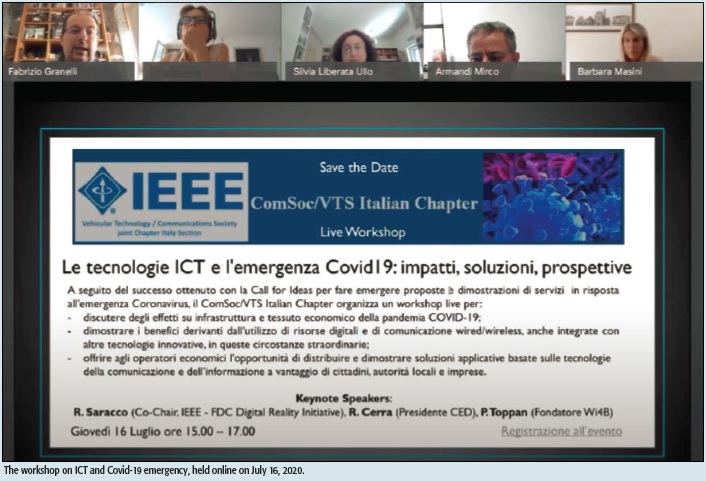
During the pandemic of COVID-19, the IEEE VTS/ComSoc Italy Chapter activated several initiatives for its members to keep them engaged in community activities, even if remotely.
A competitive Call for Ideas was opened to spring up solutions to the challenges posed by Coronavirus, leveraging the use of Information and Communications Technologies (ICTs). The main objectives of the initiative were:
-
Help citizens and health workers as well as support the education system and the business world to face the emergency caused by the pandemic.
-
Develop new forms of healthcare and education in order to hold up the Italian community in the reaction to the dramatic outbreak of Coronavirus.
This initiative encouraged both young and experienced researchers of the IEEE VTS/ComSoc Italy Chapter to take an active part in the competition, by proposing ideas and methods during the lockdown period. Despite the competitive nature of the initiative, the Call for Ideas was meant as an opportunity for our scientific community to come together and define creative and unexpected solutions to face a situation that was unimaginable until a few months ago. This call further demonstrated how crucial and strategic the VTS/ComSoc activities are for the Country, as the proposed solutions addressed very relevant topics.
Examples of application areas for the Healthcare theme (but not limited to) were:
-
Remote diagnosis, initial treatment and follow-up of patients.
-
Real time support or training for medical personnel using videoconferencing or telepresence systems.
-
Planning of medical resources.
-
Follow-up of patients with other diseases.
-
Remediation of infected areas.
-
Remote assistance for children and families who cannot be physically reached by social support workers.
-
Ensure the mental health and well-being of people confined to home.
Examples of application areas for the Education theme (but not limited to) were:
-
e-learning.
-
Remote training and education for teachers and students.
-
“Virtual” social interaction to involve children.
Examples of application areas for the business theme (but not limited to) were:
-
e-training and e-conferencing for entrepreneurs.
-
Social spacing monitoring techniques
-
New forms of promotional events and networking between companies.
The evaluation criteria used to rank the submitted ideas were their innovative content, their interdisciplinarity approach and feasibility, the accuracy of the project structure, and the degree of completeness and clarity of the submitted document. Three ideas were finally selected and funded.
To further promote the use of science and technology to counteract the pandemic, the IEEE VTS/ComSoc Italy Chapter also organized a live workshop, titled: “ICT and the Covid-19 emergency: impacts, solutions, perspectives”, whose Keynote Speakers were: Roberto Saracco, IEEE Co-Chair - FDC Digital Reality Initiative; Rosario Cerra, President of the Italian Digital Economical Center; and Paolo Toppan, Founder of the Wi4B engineering company.
The three Keynote Speakers addressed the workshop topic from three different perspectives:
-
The lockdown and the pandemic’s impact on both the Italian telecom infrastructures and industries.
-
The economic benefits of using digital and wired/wireless communication resources, also integrated with other innovative technologies, during such an extraordinary and unique emergency.
-
The integration of artificial intelligence and communication technologies into newly conceived devices, especially designed to support citizens, local authorities and businesses.
The discussion was also enriched by a round table which was attended by more than 70 registrants and that was honored by the presence of Mirco Armandi, director of the department of “Information Systems and Technological Development” of “Emilia Romagna Public Transportation” (TPER), and Luca Foresti, Chief Executive Officer of Centro Medico Santagostino, who further discussed the impact of the pandemic on policies, management and services of public transportation and medical situations. Panel discussions underlined the need for identifying proper actions to support communications and ICT technologies in general to enhance their performance during emergencies.
In addition, the Chapter activated a series of webinars by international experts, within an initiative called “COMMS4ITALY”, especially targeted to the young audience of researchers having difficulty in meeting and knowing the experts in the field of communications and their visions. In particular, the following webinars were proposed that attracted globally more than 200 attendees:
-
Jaafar Elmirghani (Univ. of Leeds, UK), “ICT Sustainability”.
-
Lajos Hanzo (Univ. of Southampton, UK), “Quantum Communications”.
-
Ashutosh Dutta (IEEE Future Networks Founding Co-Chair), “IEEE Future Networks Roadmap”.
-
Frank Fitzek (TU Dresden, 5G Labs Germany), “5G Rules, who needs 6G?”.
The webinar series was supported by CNIT (Italian National Consortium of Telecommunications), and it resulted in collecting more than $2000 in donations for the Italian Emergency Services. The presentations were recorded and will be made available through the ieee.tv platform to all ComSoc members.